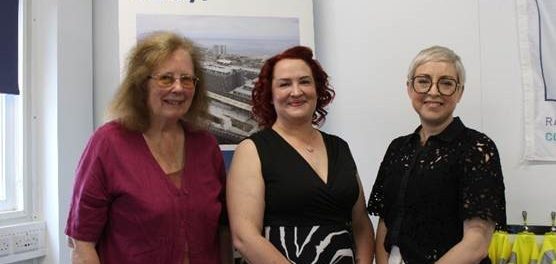CITB backs new suicide support programme alongside NHS Wales
 Left to right: Julie Morgan, Member of the Senedd, Ceri Fowler, NHS Wales Suicide Prevention and Self Harm Programme, and Julia Stevens, Construction Industry Training Board
Left to right: Julie Morgan, Member of the Senedd, Ceri Fowler, NHS Wales Suicide Prevention and Self Harm Programme, and Julia Stevens, Construction Industry Training Board
The campaign will be rolled out across construction sites in Wales to raise awareness of suicide and signposts people to support
The Construction Industry Training Board (CITB) has partnered with the NHS Wales Suicide Prevention and Self Harm Programme to roll out a campaign across construction sites in Wales that raises awareness of suicide and signposts people to support that is available. A poster campaign is being rolled out across construction sites in Wales, and other resources, such as short ‘toolbox talks’ on suicide awareness training, are being developed as part of the initiative.
Male suicide rates in Wales are more than three times the rate of women. There are a number of factors that contribute to suicide risk in the industry, including job insecurity driven by short-term contracts, fatigue from long working hours, financial pressures, workplace culture that discourages conversations about mental health, and alcohol and substance use as a coping strategy. Stigma associated with mental health challenges often prevents people from seeking support until they are in crisis. Early help and support are vital to support recovery and improve outcomes.
The initiative has been launched at two events, the first at the site of the new Velindre Cancer Centre in Cardiff overseen by Sacyr, one of the biggest construction projects Wales has seen in decades, which is due to open in Spring 2027. Julie Morgan, Member of the Senedd for Cardiff North, attended the event, sharing ambitions for people to be able to speak freely without fear of stigma. The second event has taken place in North Wales on the site of a new school in Flintshire.
The partnership between the NHS in Wales and Construction Industry Training Board represents a collective effort to improve the mental health and wellbeing of people working in the construction industry.
Julia Stevens, Engagement Director for Wales at the Construction Industry Training Board, said: “There has been lots of positive progress in the construction industry in recent years to raise awareness of mental health challenges, reduce stigma, and enhance access to support. This initiative is one of many taking place across the industry to improve mental health and wellbeing. We’re proud that this campaign will further build on this momentum to help us create meaningful change. It’s vital that we look after our workforce and create the right culture where people can access to support without fear of stigma, ultimately saving lives.”
Dr Chris O’Connor, Clinical Lead in the Strategic Programme for Mental Health at NHS Wales Performance and Improvement, said: “Stigma can be a huge barrier to people accessing mental health support. We hope that by raising awareness of suicide risk and mental health, and signposting support offerings available, we will encourage people working in the construction industry to have important conversations about their wellbeing, support each other and feel confident in being able to reach out for support.”
Since 2020, CITB has supported nearly 52,000 people to complete mental health first aid and awareness training through its short courses and is vocal about the need for greater access to mental health support in the construction industry.
Information and support
National Advisory and Liaison Service Cymru – a free and confidential service in Wales for anyone affected by suicide. Call free on 08000 487742.
C.A.L.L. Mental Health Helpline – Community advice and listening line. Call free on 0800 132737.
Lighthouse – The construction industry charity – 24/7 helpline and text service offering free and confidential support and advice on any life problems – emotional, physical, or financial. Call 0345 605 1956, or text HARDHAT to 85258.
NHS 111 WALES PRESS 2 – For urgent mental health support, call NHS 111 and press option 2. The service is available for people of all ages, 24 hours a day, 7 days a week in all areas of Wales.

